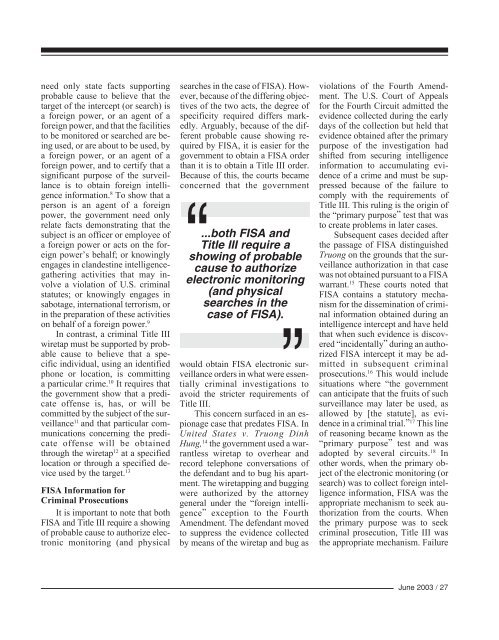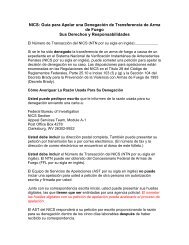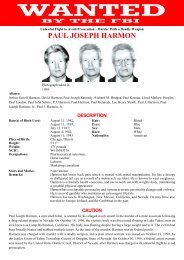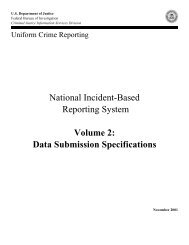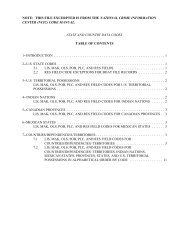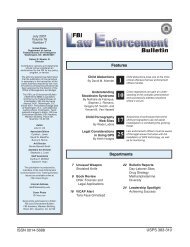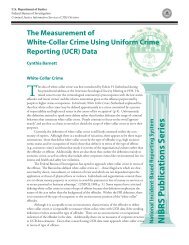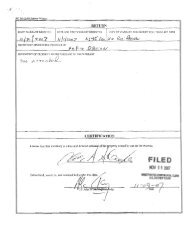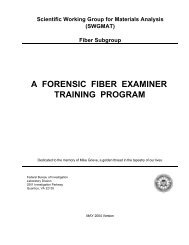F B I Law Enforcement Bulletin - June 2003 Issue
F B I Law Enforcement Bulletin - June 2003 Issue
F B I Law Enforcement Bulletin - June 2003 Issue
Create successful ePaper yourself
Turn your PDF publications into a flip-book with our unique Google optimized e-Paper software.
need only state facts supporting<br />
probable cause to believe that the<br />
target of the intercept (or search) is<br />
a foreign power, or an agent of a<br />
foreign power, and that the facilities<br />
to be monitored or searched are being<br />
used, or are about to be used, by<br />
a foreign power, or an agent of a<br />
foreign power, and to certify that a<br />
significant purpose of the surveillance<br />
is to obtain foreign intelligence<br />
information. 8 To show that a<br />
person is an agent of a foreign<br />
power, the government need only<br />
relate facts demonstrating that the<br />
subject is an officer or employee of<br />
a foreign power or acts on the foreign<br />
power’s behalf; or knowingly<br />
engages in clandestine intelligencegathering<br />
activities that may involve<br />
a violation of U.S. criminal<br />
statutes; or knowingly engages in<br />
sabotage, international terrorism, or<br />
in the preparation of these activities<br />
on behalf of a foreign power. 9<br />
In contrast, a criminal Title III<br />
wiretap must be supported by probable<br />
cause to believe that a specific<br />
individual, using an identified<br />
phone or location, is committing<br />
a particular crime. 10 It requires that<br />
the government show that a predicate<br />
offense is, has, or will be<br />
committed by the subject of the surveillance<br />
11 and that particular communications<br />
concerning the predicate<br />
offense will be obtained<br />
through the wiretap 12 at a specified<br />
location or through a specified device<br />
used by the target. 13<br />
FISA Information for<br />
Criminal Prosecutions<br />
It is important to note that both<br />
FISA and Title III require a showing<br />
of probable cause to authorize electronic<br />
monitoring (and physical<br />
searches in the case of FISA). However,<br />
because of the differing objectives<br />
of the two acts, the degree of<br />
specificity required differs markedly.<br />
Arguably, because of the different<br />
probable cause showing required<br />
by FISA, it is easier for the<br />
government to obtain a FISA order<br />
than it is to obtain a Title III order.<br />
Because of this, the courts became<br />
concerned that the government<br />
“<br />
...both FISA and<br />
Title III require a<br />
showing of probable<br />
cause to authorize<br />
electronic monitoring<br />
(and physical<br />
searches in the<br />
case of FISA).<br />
would obtain FISA electronic surveillance<br />
orders in what were essentially<br />
criminal investigations to<br />
avoid the stricter requirements of<br />
Title III.<br />
This concern surfaced in an espionage<br />
case that predates FISA. In<br />
United States v. Truong Dinh<br />
Hung, 14 ”<br />
the government used a warrantless<br />
wiretap to overhear and<br />
record telephone conversations of<br />
the defendant and to bug his apartment.<br />
The wiretapping and bugging<br />
were authorized by the attorney<br />
general under the “foreign intelligence”<br />
exception to the Fourth<br />
Amendment. The defendant moved<br />
to suppress the evidence collected<br />
by means of the wiretap and bug as<br />
violations of the Fourth Amendment.<br />
The U.S. Court of Appeals<br />
for the Fourth Circuit admitted the<br />
evidence collected during the early<br />
days of the collection but held that<br />
evidence obtained after the primary<br />
purpose of the investigation had<br />
shifted from securing intelligence<br />
information to accumulating evidence<br />
of a crime and must be suppressed<br />
because of the failure to<br />
comply with the requirements of<br />
Title III. This ruling is the origin of<br />
the “primary purpose” test that was<br />
to create problems in later cases.<br />
Subsequent cases decided after<br />
the passage of FISA distinguished<br />
Truong on the grounds that the surveillance<br />
authorization in that case<br />
was not obtained pursuant to a FISA<br />
warrant. 15 These courts noted that<br />
FISA contains a statutory mechanism<br />
for the dissemination of criminal<br />
information obtained during an<br />
intelligence intercept and have held<br />
that when such evidence is discovered<br />
“incidentally” during an authorized<br />
FISA intercept it may be admitted<br />
in subsequent criminal<br />
prosecutions. 16 This would include<br />
situations where “the government<br />
can anticipate that the fruits of such<br />
surveillance may later be used, as<br />
allowed by [the statute], as evidence<br />
in a criminal trial.” 17 This line<br />
of reasoning became known as the<br />
“primary purpose” test and was<br />
adopted by several circuits. 18 In<br />
other words, when the primary object<br />
of the electronic monitoring (or<br />
search) was to collect foreign intelligence<br />
information, FISA was the<br />
appropriate mechanism to seek authorization<br />
from the courts. When<br />
the primary purpose was to seek<br />
criminal prosecution, Title III was<br />
the appropriate mechanism. Failure<br />
<strong>June</strong> <strong>2003</strong> / 27


